https://www.gardenersworld.com/how-to/grow-plants/how-to-grow-tomatoes/
Red-shirting, redo, and review
I’ve just finished reading an article about red-shirting in The Atlantic and it made me review some of my thoughts and practices (after I found out what “red-shirting” meant.)
https://m.facebook.com/story.php?story_fbid=10157637655798487&id=29259828486
I remember having a conversation with a parent about my daughter going into kindergarten early. She was born in December so she would always be the youngest in the class going through school.
He said he would never do that, he wanted his kid to have every advantage in her class, starting with being the oldest. I was thrown aback by this. I hadn’t thought of age as being a competitive advantage nor of school, particularly kindergarten, being so focused on competition between kids. I was a single mum, day care was expensive, and I wanted my daughter to thrive in the French immersion program (looking back, I did think that learning another language would help her in other areas …music and mathematics, so perhaps I was being calculating after all).
I am so fed up with school being focused on competition between students (via parents) and ranking kids. I want school to be about kids learning and being nurtured, working together, being supported in their adventures by caring, dedicated professionals.
Equitable education. Not different or less than because of where you live and who your parents are or how many parents you have.
Meet kids needs where they’re at.
Flash back to graduation of the other parent’s kid. He spent at least 6 months creating videos of her sports skills, sending them to schools all over the States to get her in. He didn’t want her in an A.P. class unless there was a bump to her grades built into the course, which there was, otherwise she’d be in regular classes always being the top student. No thought about the depth of learning, just about how it looked on paper.
My daughter graduated, yeah! She experienced years of being pulled from her classes getting extra help. (This colours my view on inclusivity and labeling students but that’s another post). No university (yet) and I’d be lying if I said that I’m ok with that but it’s not my life. My experience with her learning journey has influenced my practice to the point where I would go gradeless if I could, where I focus on the process rather than the product, where questions drive learning and mistakes are valued.
My students collect evidence of learning over the semester, they lead conferences with their parents sharing what they’ve learned, they have choice at the end of the semester to write an exam or present what they’ve learned any way they want. Then we discuss their grade.
I am at the tail end of my teaching career, one that I entered late in life and one that drives me to amazing highs and deep, agonizing lows. I still feel passionate and connected to teaching but spend my days working at a garden centre (my career for 20 years before I became a teacher)because I don’t fit in with the local school district (I moved to a beautiful, if somewhat remote, town on the coast, left a great school and some lovely people). I’m not sure how long it’ll take me to find my new niche or if I’ll ever teach again (hard to even wrap my head around the idea). Doesn’t mean I’ll stop thinking about how to support kids and learning.
Thankful
A parent of one of my paddlers stopped by to thank me for coaching her daughter. It reminded me that teaching is more than what happens in the classroom. The parent remembered me because I was “fun” when she spoke to me last year.
I’m not feeling fun, just exhausted with a tank that’s running on empty so the complement was timely.
A colleague, who teaches our special needs kids, spoke to me as I was leaving school. One of her students is in my SR12 class. The student is not very verbal but apparently she goes home and chats about her experiences in class. I’ve watched her working in the garden, focused, engaged, interested in what’s going on. It’s so nice to hear about what’s working for a change. It’s lovely to be thanked.
Lately, I feel as if my focus is on kids that struggle or who are hitting a wall. Whether real or imagined, these stresses cause melt downs and students stop functioning, learning becomes impossible. Poor choices are made by some students in an effort to meet some extrinsic, artificial target. Teachers become counsellors, trying to meet the needs of parents, students, and colleagues. Our own mental health is at risk.
So I am very thankful for those parents, students, and colleagues who let me know that what I do is having an impact; that I’m making a difference with my kids.


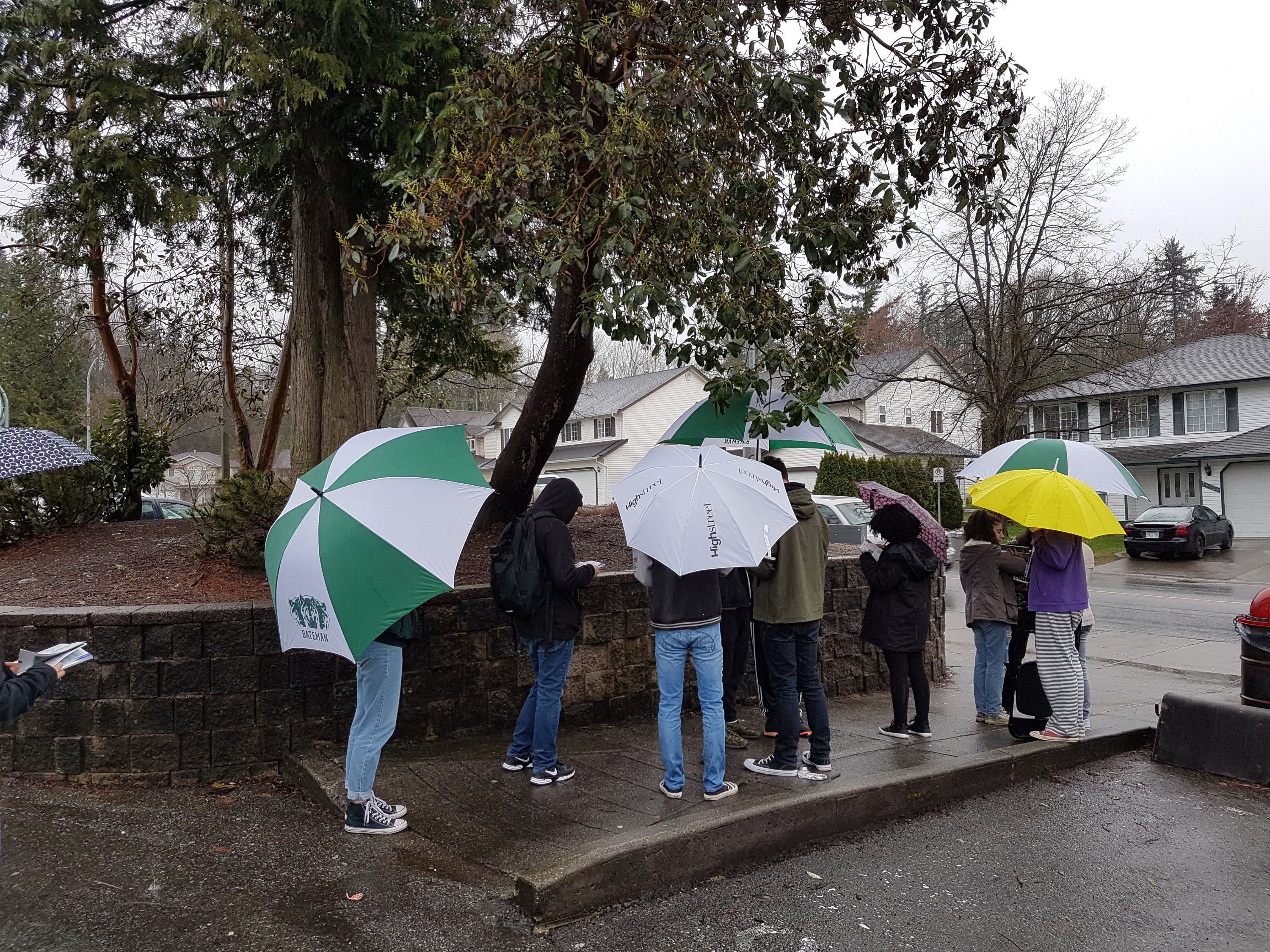





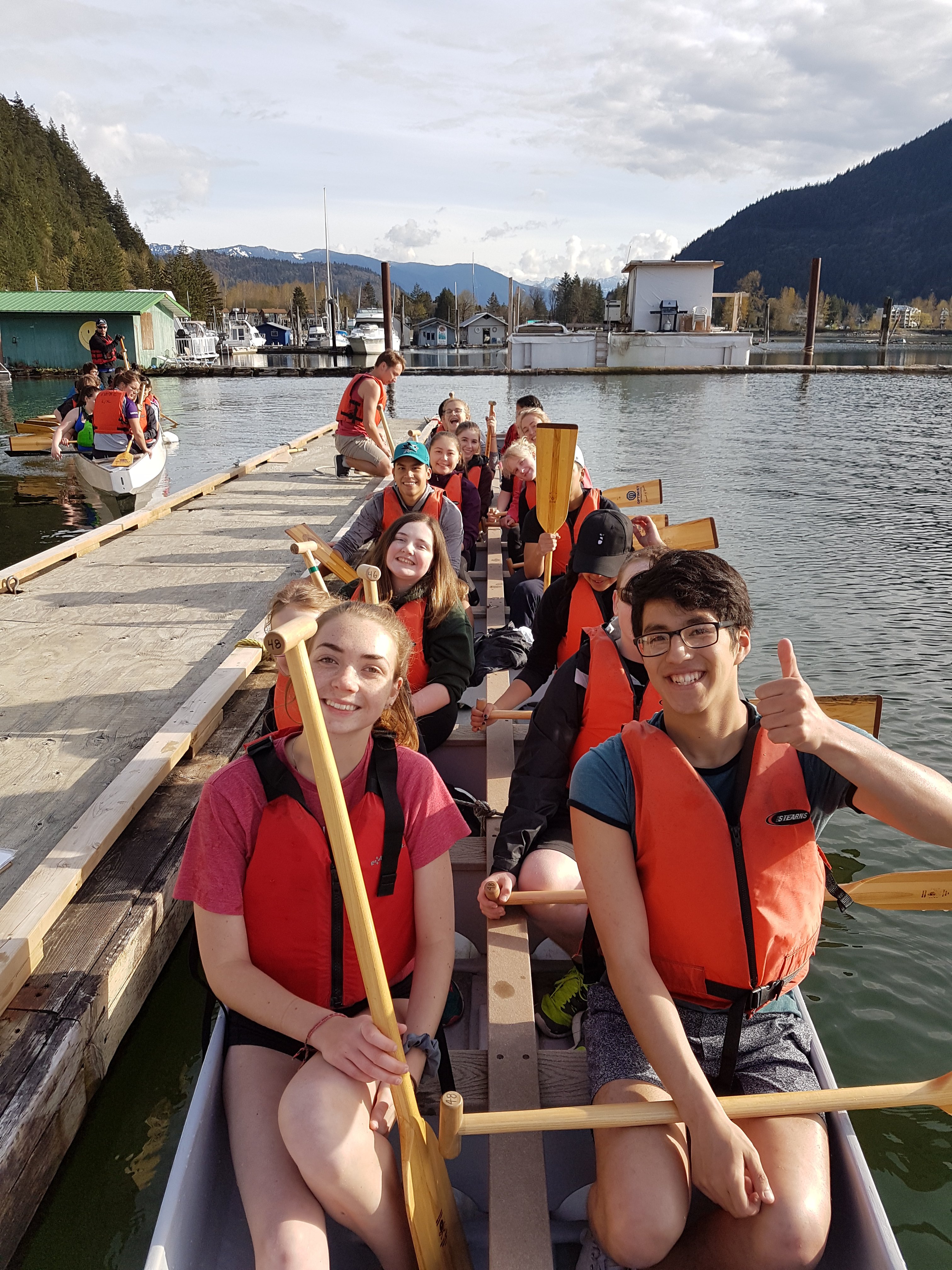
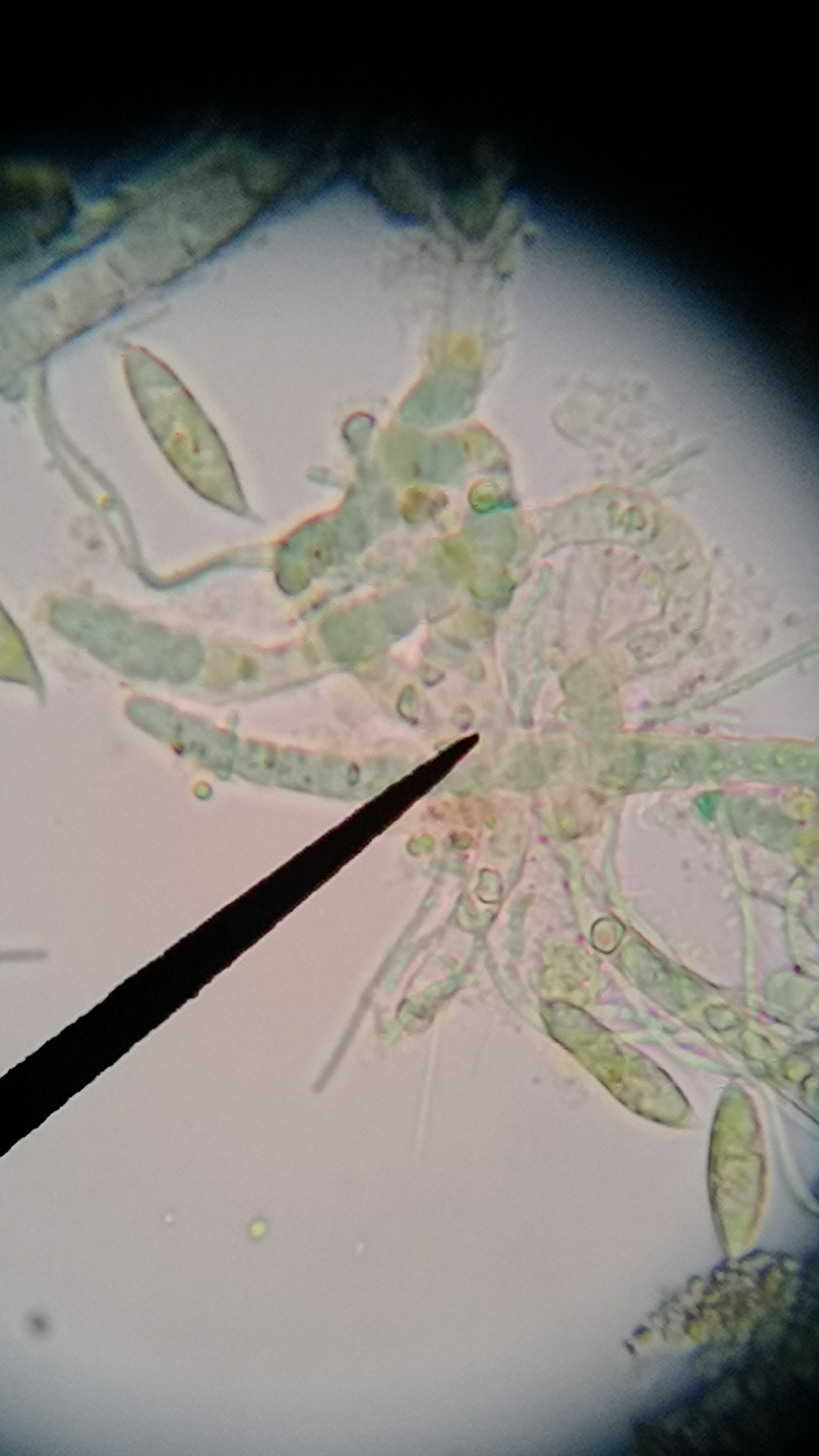

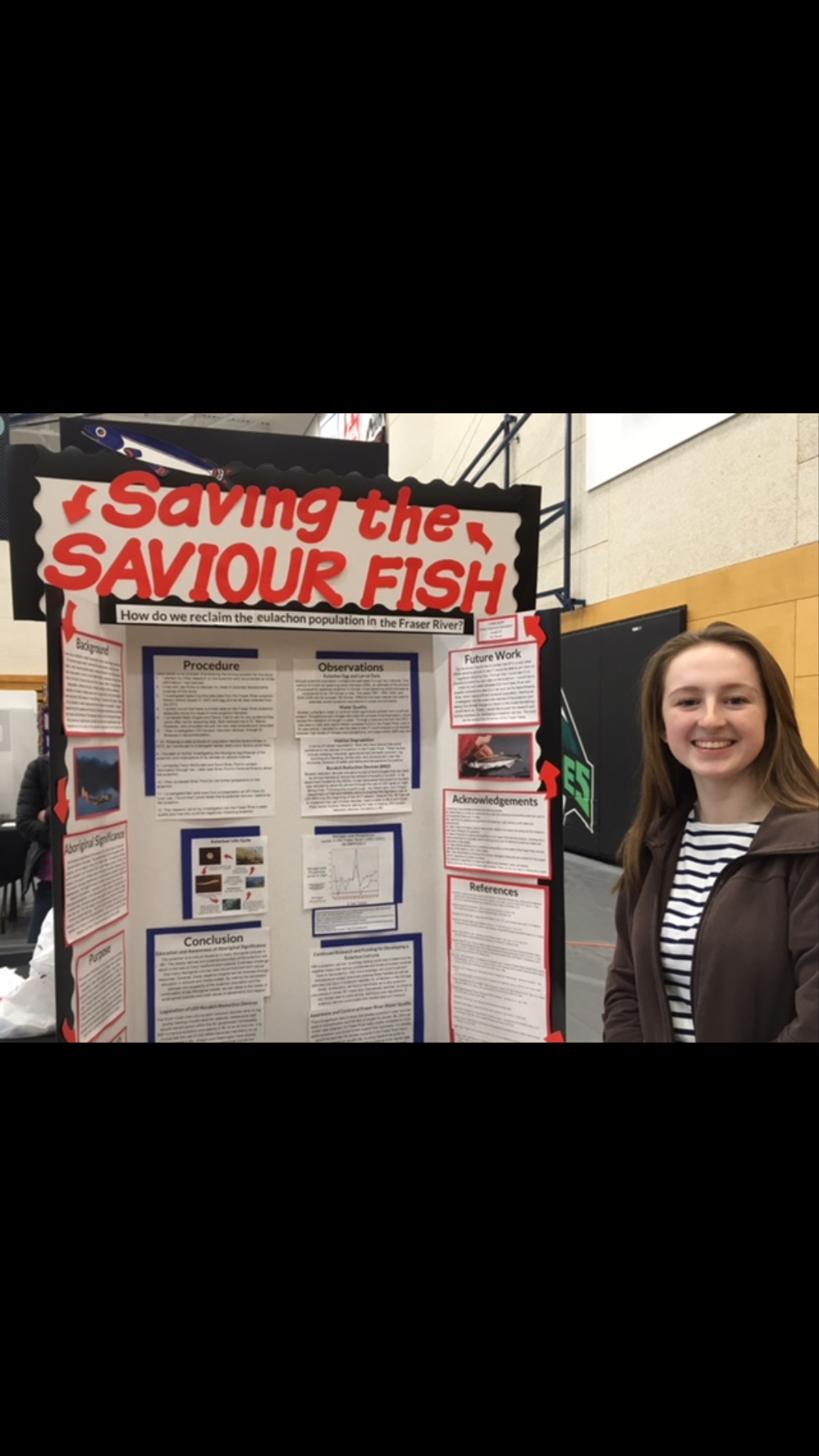

Student-led post conference thoughts
I started doing student-led conferences instead of parent teacher conferences last year and the response was less than overwhelming so I was worried about doing it again.
But I believe it’s the right thing to do. It’s a way to faciltate discussions about learning instead of grades and a way to develop student agency. I know that it takes time to change the status quo so I’m sticking with it.
Fast forward to today and I’m in defensive mode before anyone is through my door, anticipating the worst. Boy, was I wrong. I had such a positive experience. I was able to stand back and witness the conversations as kids came in with their parents, grabbed their folders, and shared their learning. The conversations were thoughtful. Kids were talking not just about what they learn but how they learn.
I saw a 16 year old using a white board to teach her mum about DNA replication. I saw students describing the process of learning, what excited them and where they struggle. I learned so much about my kids while discussing the discrepancies between how they assessed their work habits and my observations of what hampers their learning. I listened, they were heard. It’s the best, most positive way to celebrate learning. I just wonder why we have the conversation so late in the semester.
Student evidence of learning
I provide students with lots of different ways to show what they know, both formatively (practice, ongoing) and summatively (a snapshot). Sometimes they produce models, sometimes they teach us something they’ve researched and sometimes it’s a traditional old-school test. I always ask them to summarize their learning any way they want prior to the test. And I always get something that surprises me; today was no exception.
This one will leave an impression on me forever. The student is from Brazil. His analogy of protein synthesis using Lego purchased online one piece at a time is a first. But what really resonated with me is his reflection…
“Proteins have a vital participation in the human body that understanding them is understanding us. Any mistake in protein synthesis can cause terrible diseases so by understanding and studying the substances we can better treat or avoid this complications. A bit of knowledge about this subject could help eliminate prejudice because studying DNA has proved that humans 99.9% equals, especially as a young black man.”
Not all of my students connect so deeply with the stuff we learn, but I always ask them to try. It’s hard, it’s not out of a text book, it’s not Googleable but I think it’s a clear demonstration of understanding and thinking.
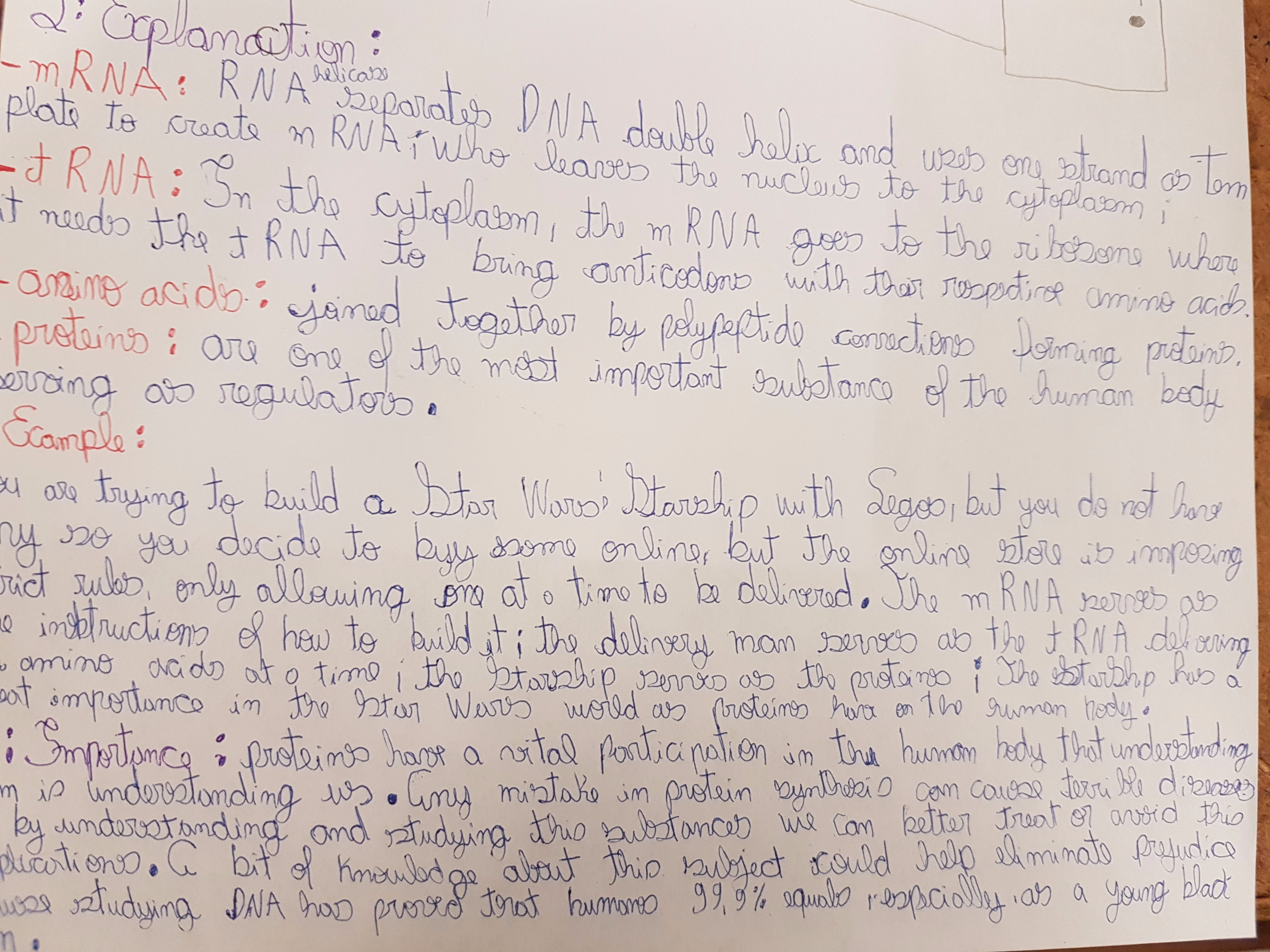
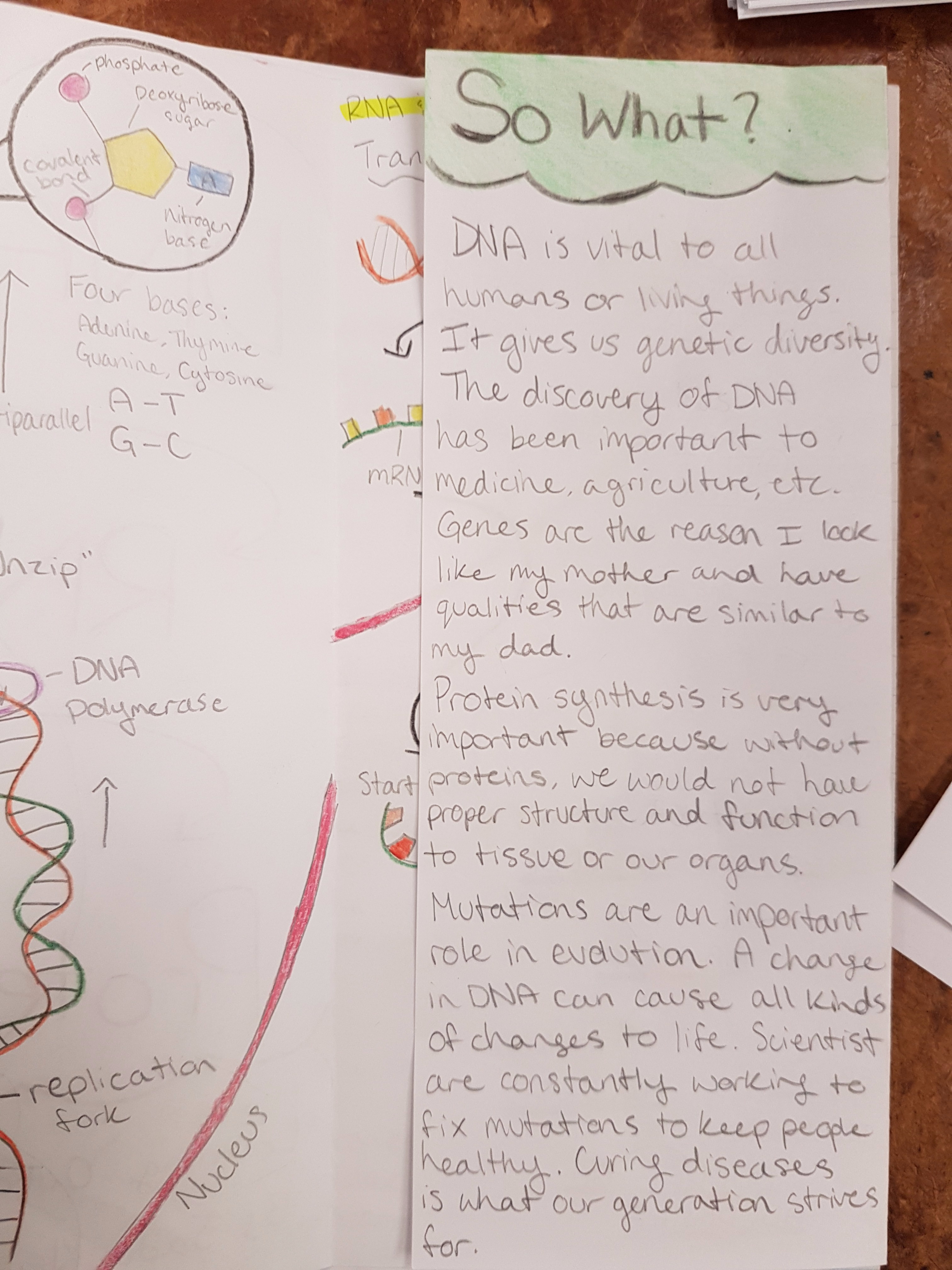
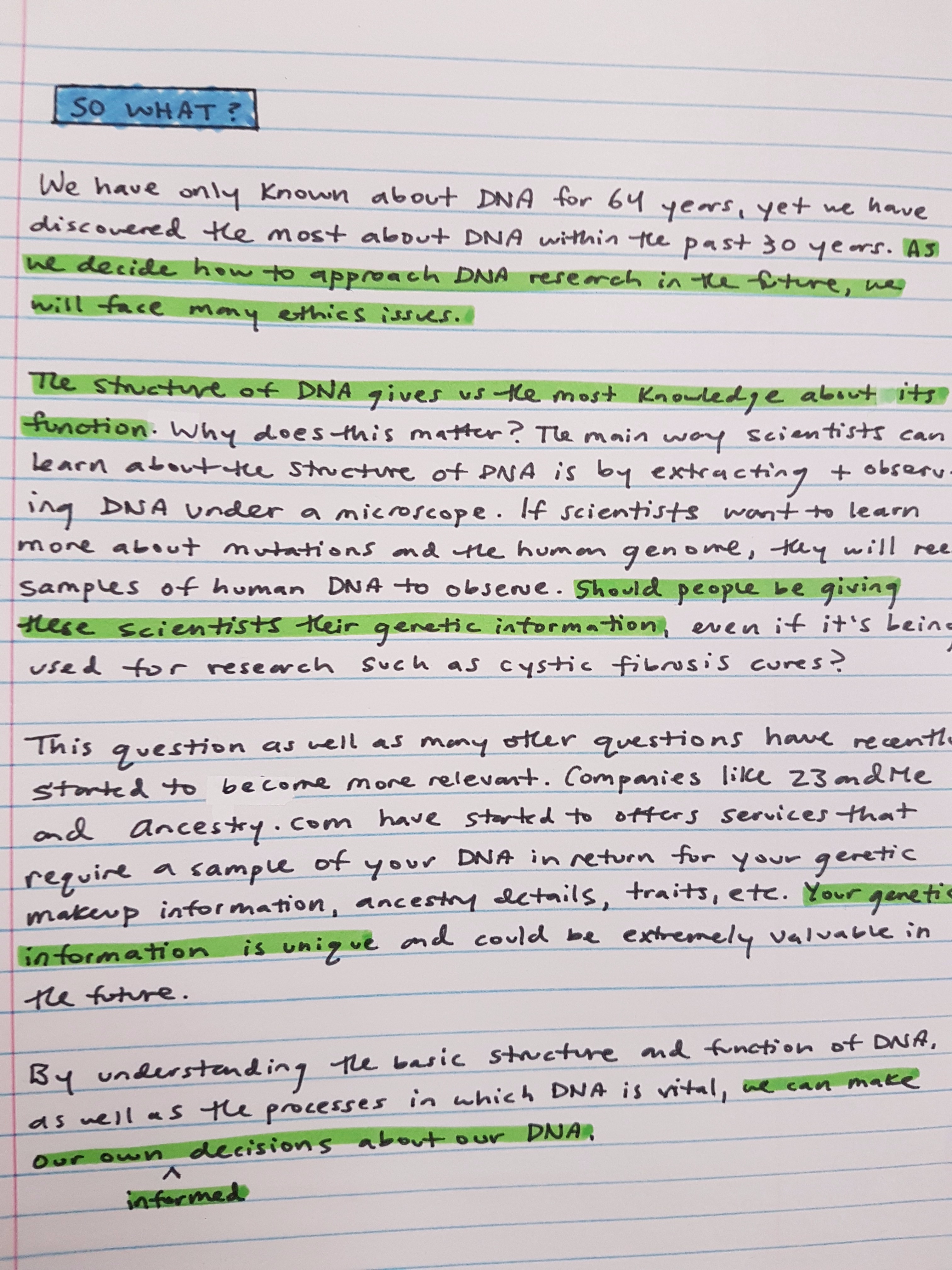
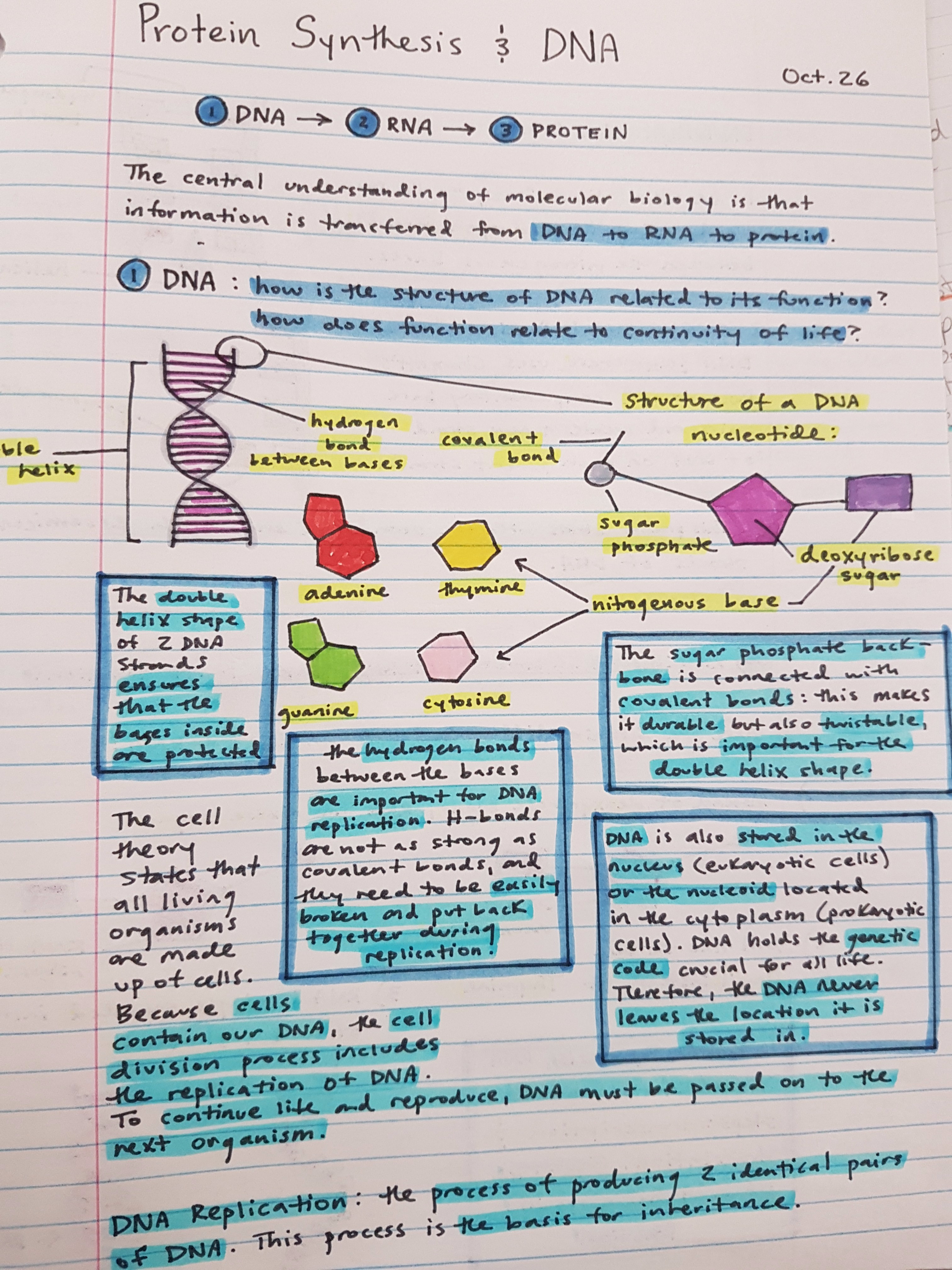
Back at ‘er ( it’s different this time)
We’re all back at it, but for me it feels different this time. I know that many of us don’t sleep well the night, days, weeks before school starts. It’s an insomnia specific to teachers. But I find myself crying and overwhelmed and not wanting to do it anymore…and I love teaching.
I’m like a piece of wet cloth wrung out to dry; I’ve nothing left to give…to myself, to anyone.
But I see the lovely faces of my kids from last semester and my cup begins to fill. I hear my kids’ questions, I sense their curiosity, … and in spite of how I feel, in spite of Harvey and Irma and fires and floods and earthquakes (and Trump), my heart and mind are inspired.
Don’t get me wrong. I’m exhausted before I’ve even started. But there’s something about being in the classroom that stokes my fire…maybe I can do it again.
Presentations of Learning…so much more than content
As I’m listening to my 35th presentation of learning (POL) this week, I have to remind myself that it’s probably the first presentation of the week (if not the only one) for this student and reset my mind to be open to what they have to tell me. “Be present, Bacon!”
So many students (at least 75%) have chosen to demonstrate their learning by creating a POL instead of write a comprehensive exam and, for the most part, it’s a positive and rewarding experience for both of us.
When I ask them why they chose a presentation over the exam and/or what their biggest take away is I get some surprising and revealing responses. Here are some quotes and representations from some of my students.
“I have learned a lot from taking this course. This course isn’t for everyone and there are a lot of people who say Sustainable Resources is easy but it’s not. It’s not a course where you sit around and hope you “just pass” (Like me). I have learned multiple things and some of them are that if you want something you have to get up and do something about it. Also that fish can be a fertilizer for plants and you could grow plants with their poop . Also I learned that gardening is pretty hard and you have to maintain your garden and take care of it almost everyday.
I’ve learned that a lot of things aren’t given to you like if you plant something it’s not gonna magically grow like you want it to, I’ve also learned that this course is a good one to show you who you really are and that you can become someone better. I have now made a garden at my house since I started this course and my garden now is growing strawberries and turnips and it’s booming and i couldn’t have done it without the knowledge of sustainable resources. ” V.S.
“Learning how to grow plants has helped me grow as a person.” V.S.
” The reason I chose a presentation of learning was because I believe education is only valuable when you can interpret it and use it to your needs. By connecting my learning to the outside world and problems today, I could figure out how education can be a solution. If you are just learning or memorizing without connections, I don’t think it can be later used for real problems.
This semester, I learned that my interest was chemistry out of the three sciences. I found chemistry the easiest for me, and I was really glad that I could narrow down the path to what I want to become. However, I chose to present on biology and physics instead because I wanted to challenge myself since I felt like I didn’t understand these two subjects as much as chemistry. I thought of my presentation as an opportunity to dig deeper into these subjects. I’m quite pleased with the results because I feel like I’ve gotten closer to these subjects through my presentation.” S.J.

” When I chose POL, aside from the initial thought that it was easier I also knew it was an opportunity to present what I know. To prove that I took something away from this course, rather than simply receiving a grade on an exam to show I understood the material, I want to expand on that by displaying what I knew but also reflecting on how I felt, the challenges I faced and how I overcame them or maybe I still struggle with them. In closing, I felt the Presentation of Learning was overall a better experience for me, over sitting in an exam room and writing an exam for an hour or two. I hope you enjoyed it as much as I did making it.” A.M.

This is Important: Reflecting on Valuing the Person More than the Content
The context: Chemistry with my Grade 10s, last period before a 4-day weekend, with a hoe down in their pockets. My student receives a phone call. I’m like ” REALLY!”
I hear him say, “Can I call you back because my teacher is going to blow?”
I ask him… “What is up with that?”
He says, ” She’s a really nice person and she’s stuck. Her car’s broken down and she called me for help.”
So I said, “Go ahead outside and call her back.” He looked at me in disbelief and called her back.
15 minutes later, having missed some big ideas, he came back in and got back to work. He talked to me after class and thanked me for letting him call her. Her car had broken down on Hwy. 3 on the way to Princeton. She was on her own. My student is 15 with an IEP. He struggles with written output but is bright and loquacious/ chatty. He was able to tell his friend how to figure out what was wrong with her vehicle. He sounded mature beyond his years, valued and respected. I’m thinking that some things (many things) are far more important than being able to draw a Bohr model of an ion.
Happy Easter!
Etc.
I’ve been learning about assessment, both formative and summative, for many years now. I’ve been fortunate enough to attend different conferences featuring my assessment gurus, John Hattie, Dylan Wiliams, Ken O’Connor and Myron Dueck. I am constantly online reading posts by Alfie Kohn, Starr Sackstein, Thomas Guskey, and Jennifer Gonzalez.
I post daily learning targets, my assessments are organised by targets/standards and I use performance standards for all of my assessments. I don’t give zeros, I allow rewrites, I embrace any demonstration of thinking and learning and learning from mistakes.
I still find myself thinking about summative assessment, its importance and whether I am doing the right thing. I don’t want learning to be limited by test taking. I resent the time it takes away from learning. I hear teachers worrying about end of year comprehensive exams being replaced by alternative ways of student demonstrations of learning. They sound threatened by anything that is not their 2-3 hour comp. exam, as if they can’t justify the semester or their job without this traditional trial by fire.
I wonder how can you not know what your students understand if you are assessing formatively on an ongoing basis? Why do you require an end of term comprehensive exam to maintain rigor?
I keep trying new things. Last week I had students complete a model of succession as a group rather than individually and we did it outside using chalk rather than on paper. I could walk around and hear their thinking and ask questions to clarify their thinking.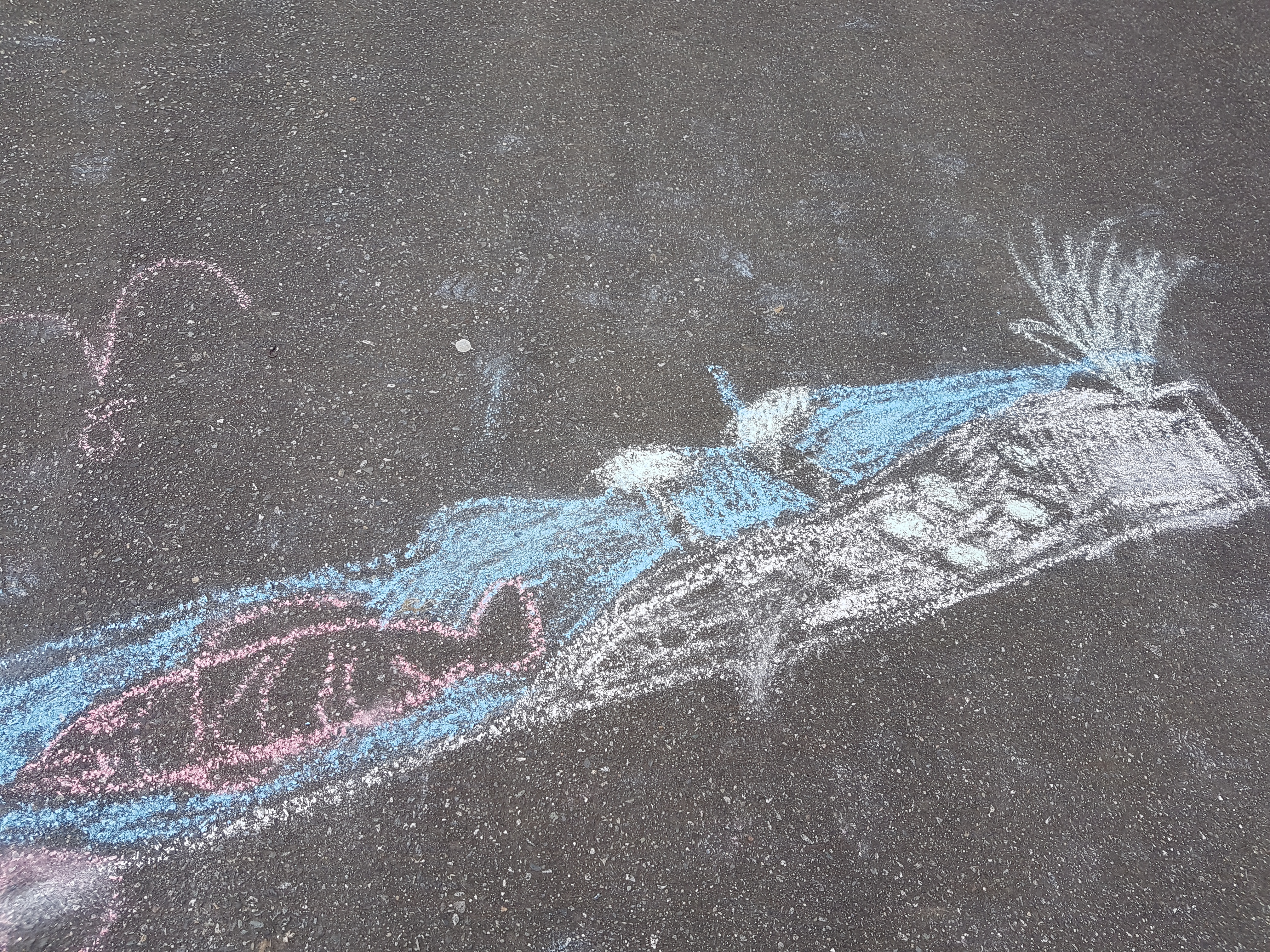
And while I don’t usually assign text questions, this time I assigned review questions to one class individually and to another class as a collaborative endeavour. The former required lots of walking around trying to get kids to stay on task while the latter involved lots of listening to kids thinking and questioning. It was so refreshing and I wondered why I hadn’t thought of this before.
Finally, a different way to summatively assess: choice.
4 choices in fact…students could create a learning summary or a letter to the editor or an infographic or take the traditional test.
After class one student asked, “Can we do the same thing next time?” #assessment





